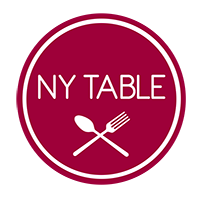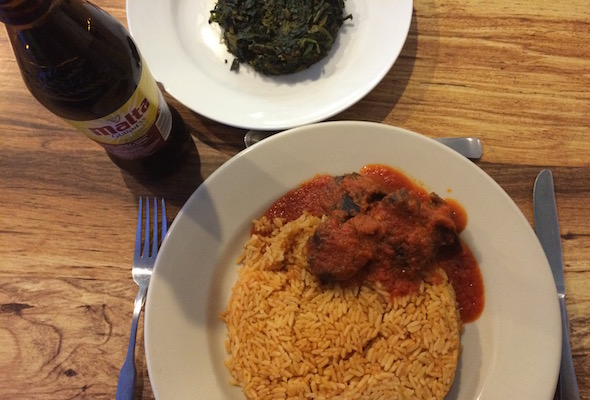A taste of home
The corner restaurant is small, only five tables, but open and light, with large windows and mirrors on the opposite wall to create the illusion of space. Traditional African masks hang on the walls, and the booths’ green chairs evoke the green-and-white stripe national flag of Nigeria, a West African country. Wazobia, the name of Staten Island’s only full-service Nigerian restaurant, translates to “come, come, come.”
In 1997, Lara O. Adesuyi moved to Staten Island with her husband Olusegun and youngest daughter, Dami, from Ogun State in Nigeria. Sixteen years later, in August 2013, they opened Wazobia Restaurant in the Stapleton neighborhood. Lara, 56, is a registered nurse with a passion for caretaking. “Cooking is part of caring, so why not give it a go?” she says of her decision to open the restaurant, after years of friends and family pressuring her to do so. She has a number of Nigerian customers, but people from all backgrounds come into her restaurant.
According to census data released in 2013 by the New York City Department of City Planning, only three percent of the city’s immigrant population resides in Staten Island. The department also says that from 2000 to 2011, the African-born population in New York City increased by 39 percent; the West African community is the largest, and seven percent of immigrants of that group live on Staten Island – four percent Liberian and three percent Nigerian.
The Adesuyi family was unhappy after years of political unrest in their home country, Lara says, and needed change. But the big move required some sacrifices. Initially, the family’s two older children, Dave and Sewa, stayed behind until their parents finalized plans and found a place to live; only Dami, now 21, traveled with her parents. Otherwise, Adesuyi says making the move from Nigeria went smoothly and there were no major hurdles in preventing the family from starting their new life in the States.
Most days, Lara works as a psychiatric nurse practitioner in New Jersey; she only gets to cook once or twice a week, depending on whether she works a day or night shift. On other days, her tiny staff – sometimes as few as three people – are in charge. Olusegun works as a truck driver and does not cook, but Diane Levasseur from Gabon, who manages the restaurant on most days, does, and she steps in.
The northern section of Staten Island, including the neighborhood of Stapleton, has a relatively high and diverse immigrant population compared to the rest of Staten Island, with 31 percent of its population being foreign-born, according to 2013 census data.
Wazobia sits on a busy business district street corner opposite a Subway restaurant, right off the Stapleton Staten Island Railway stop. The space Wazobia now occupies used to be a pizzeria before the Adesuyis turned to bank loans and spent their savings to turn it into a West African eatery.
The three-page menu is filled primarily with Nigerian cuisine that draws on the country’s fondness for spices and herbs. Isiewu is goat head cooked in traditional Igbo spices like suya, which result in strong flavors and spicy, hot food.
Lara says that jollof rice – hers is cooked with onion and locust bean and served with spinach and goat meat – is a favorite dish. In its simplest form, jollof rice consists of African rice, tomatoes, onions and spices. She adds goat because she shares a widely-held Nigerian belief that it provides the human body with more energy than, say, beef.
Wazobia’s array of West African ingredients are sourced from Nigerian shops across the city. The one in Staten Island is slightly smaller, so Lara often prefers to travel to the other boroughs like the Bronx, where she can buy ingredients in bulk at lower prices. She also buys delicacies like the large West African land snails used in another of the restaurant’s most popular dishes, the spicy Igbin (snail) tomato-based stew.
On a recent Tuesday evening, an insert in the menu shows a photograph of a new dish and above it in bold letters: “Epiya To Gbe Dodo Mi,” which when translated from the Yoruba dialect means “Tilapia my justice.” Below the dish, in smaller print, it says, “Need not to travel to London for this awesome dish!” Tilapia, a popular freshwater fish found in West Africa, is also an ubiquitous farmed fish in the U.S., making it an obvious choice for Wazobia. As for the reference to London, Adesuyi says she is referring to the global idea that fish is a popular British food. “As a business person, you have to sit and think of something,” she says. The menu addition has been a success. Lara says that fish is a favorite of Filipino customers, part of the third largest immigrant group in Stapleton.
Since West African and Caribbean cooking are very similar – and since non-Hispanic members of the Caribbean community comprise the city’s third largest foreign-born population – Lara was happy to respond to requests for Caribbean dishes. To provide for those customers, Adesuyi added oxtail and curry chicken to her menu.
There are traditional beverages as well, including palm wine, a common alcoholic drink in Africa made from the sap of palm trees, and Zobo, a non-alcoholic drink made from a West African hibiscus species, mint and orange-blossomed iced tea, which is only available when the weather is warm.
Not long ago on an icy March night, Lara welcomed a customer she doesn’t know. The guest, unfamiliar with the menu, asked Adesuyi for today’s specials. Adesuyi listed one or two dishes before the customer stopped her. “No, I want Nigerian food,” which made Wazobia’s owner smile.
Tags: African, Food, Nigerian, Staten Island

Your Comments